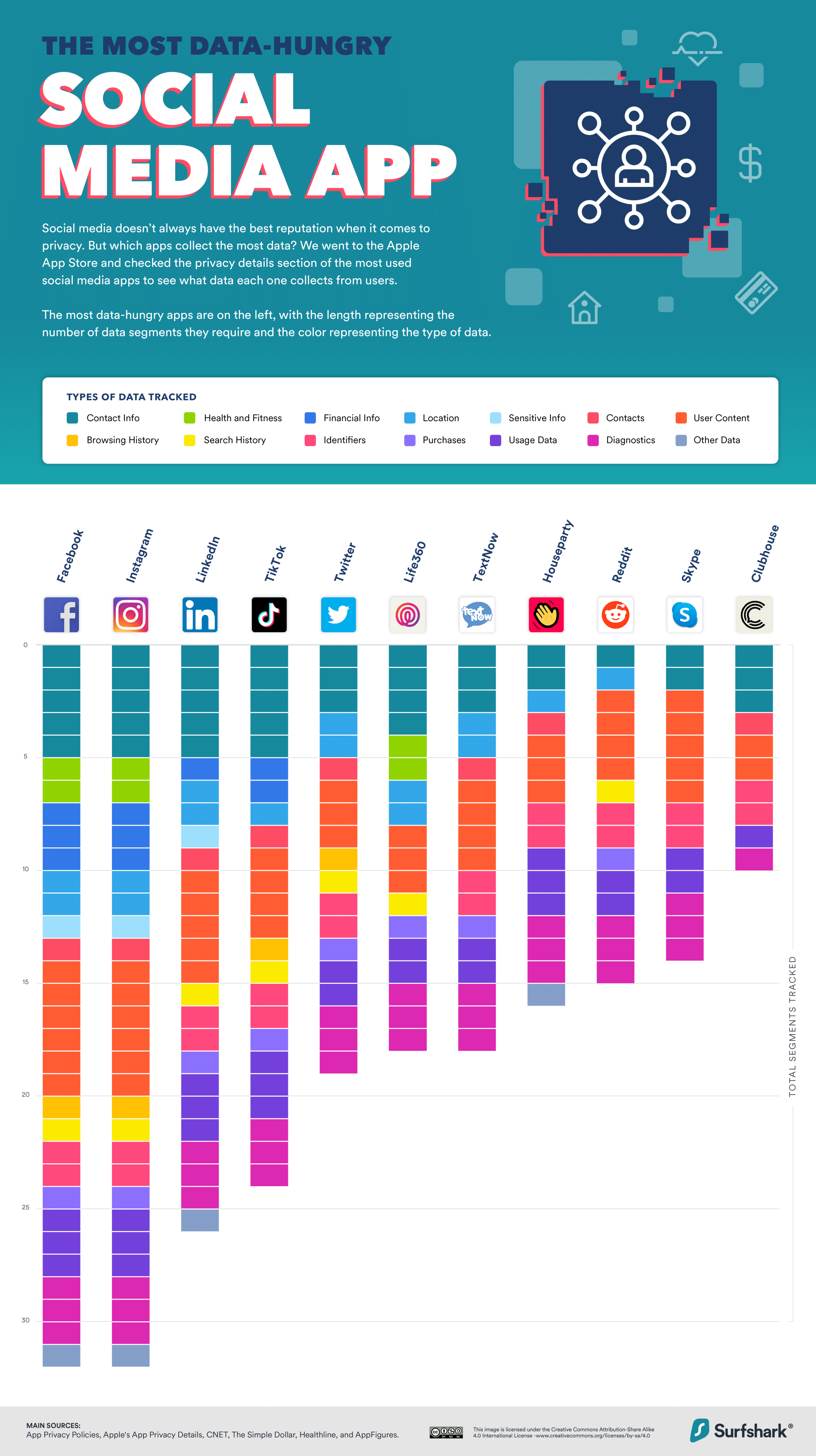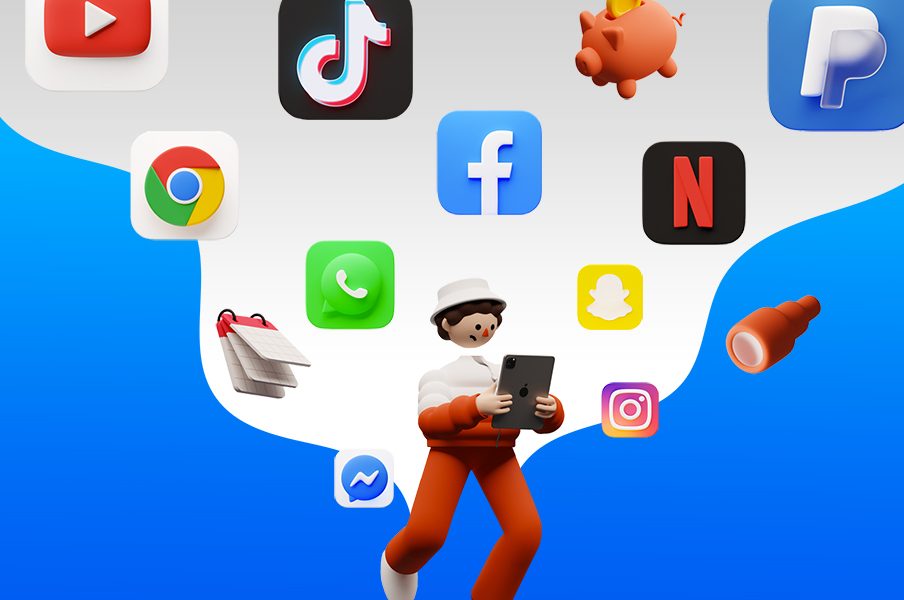“Privacy is a fundamental human right.” Apple’s corporate motto, coined in 2018, may seem like an uncontroversial statement and a fitting slogan for a technology company we entrust with our bank account and social security number. If you are familiar with the history of Apple CEO Tim Cook and Facebook founder Mark Zuckerberg, you would understand that the motto change wasn’t simply a principle to live by. The statement has direct implications and highlights the differences in the two influential tech mogul’s vision of the internet.
Apple’s most recent software update gives users the option of opting out of sharing their data with 3rd party apps. The update also parses out the app’s privacy policies in the app store in a way that can be quickly and easily understood.
In light of Apple’s efforts to provide data transparency, VPN service company SurfShark uncovered which apps collect your location, interests, personal information, and spending habits and sell the data to advertisers.
The Case Study
SurfShark’s comprehensive report outlines the intentions of 200 of the most popular 3rd party apps. They also break down the most data-driven apps from each category and give an alternative option that doesn’t require excessive data mining. The categories include:
- Messaging and video calls
- Social media
- Payments
- Shopping
- Food delivery
- Streaming
- Dating
- Personal finance
- Period tracker
- Pregnancy tracker
- Crypto
- Image editing
- Kids
The good people at SurfShark combed through the extensive privacy policy documentation for each app to understand how the companies use personal data. The types of data used in the report are the same segments identified in the Apple App Store to help their users accurately determine the intentions of each application.
SurfShark’s Key Findings
The analysis of each app’s privacy policies provides us with some exciting insights and solidifies our beliefs about certain tech giants.
An interesting finding is how little browsers use our data relative to other apps. While there is a movement to protect our data from search engine companies using alternative options such as DuckDuckGo, they are not the most data-hungry apps available online.
While browsers may be the least problematic out of all the app classifications, Google didn’t score well compared to their competitors. However, all of Google’s products topped the individual category lists for email, streaming, and browsers.
Perhaps the most alarming finding from SurfShark’s report is that the best (or at least most popular) apps require the most data. Tim Cook’s vision for internet privacy comes into question when reviewing side-by-side comparisons of companies in the same sector. Coinbase, PayPal, Waze, Priceline, DoorDash, and Amazon are all industry leaders in revenue and utilizing consumer data.
The most successful apps from each category top every single list, raising the question: is it possible to develop the best app possible without collecting excessive amounts of personal user data?
What Apps Demand the Most Data?
Google may out data-mine their direct competition, but the Facebook empire overwhelmingly dominates all technology companies. The three most data-intensive applications SurfShark found are Facebook, Instagram, and Messenger, all owned by FB.
Social media apps, in general, use the most data while producing the most useful information. We willingly give Facebook AI insights into our souls. The robots evaluating how long we stop scrolling likely have information about us that we are unaware of.
The second most data-hungry category was food delivery apps. Their intentions are a bit less nefarious than Facebook’s, but the sacrifice we make for convenient food delivery is alarming.

Why Does Facebook Need Your Personal Information?
Since 2018, Tim Cook has been less subtle regarding his views on data privacy. Cook recently aired out his opinions at International Data Privacy Day during a conference in Brussels. Without explicitly mentioning Facebook by name, “If a business is built on misleading users on data exploitation, on choices that are no choices at all, then it does not deserve our praise. It deserves reform.”
Facebook and Instagram may generate the most data but how it is utilized is what Cook finds alarming. Their entire business model is structured to create the most targeted advertising the world has ever seen.
Zuckerberg challenged Cook’s beliefs on privacy during a quarterly conference call last October; he said, “actions planned by platform companies like Apple could have a meaningful negative effect on small businesses and economic recovery in 2021 and beyond.”
Claiming to be looking out for the little guy is an interesting way to argue against data privacy, to say the least, but it’s his only argument. Facebook is built on data and needs excessive amounts of personal information to continue its social media reign. Twitter is an important platform but is only recently turning a profit. Facebook is bringing in tens of billions, and the only thing that could get in the way is the US government and platform companies.
The Future of Online Security
The report done by SurfShark gives consumers a comprehensive view of how technology companies use our data. More internet users are becoming aware of how we receive targeted advertising. The approach Apple is taking is necessary. Users have to be able to opt-out of sharing their personal information, especially if it requires hours of examining documentation to determine exactly what you are sharing.
Some people don’t mind sharing data if it means getting the most accurate product recommendations, even if it’s generated by machines harvesting their subconscious desires. However, most people would at least like to be in the loop.
Apple allowing people the option to share their data is a turning point in the history of the internet. Steve Jobs will be known for the iPhone, and Tim Cook will be remembered for protecting people’s data. Internet privacy has always been a concern, but now we are beginning to get solutions. Accessible VPNs and being able to opt-out of sharing data is hopefully only the beginning of the future of data privacy.
Like what we have to say? Sign up to subscribe to email alerts and you’ll never miss a post.










